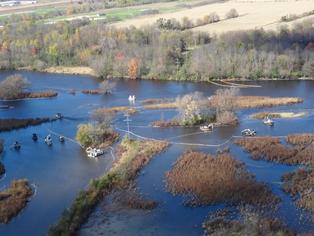 2011 clean up work of the Enbridge oil spill (credit: www.michigan.gov at http://bit.ly/29VG65p) 2011 clean up work of the Enbridge oil spill (credit: www.michigan.gov at http://bit.ly/29VG65p) The LWV Lake Michigan Region Annual Meeting in Douglas, Michigan back in 2011 included a paddleboat cruise on the Kalamazoo River, narrated by LWVMI delegate Suzanne Dixon. Instead of talking about the natural beauty or a thriving local ecosystem, our group learned about the environmental disaster caused by the oil spill from an Embridge pipe leak. Today, the U.S. EPA and the Dept. of Justice today announced a settlement with Enbridge Energy Limited Partnership (and several related companies) to resolve claims stemming from its 2010 oil spills in Marshall, MI and Romeoville, IL. Enbridge has agreed to spend at least $110 million on measures to prevent spills and improve operations across nearly 2,000 miles of its pipeline system in the Great Lakes region. These measures include:
Enbridge will also pay civil penalties totaling $62 million for Clean Water Act violations. Enbridge has already reimbursed the government for $57.8 million in cleanup costs from the Marshall spill and $650,000 for cleanup costs from the Romeoville spill, and Enbridge reportedly incurred costs in excess of $1 billion for required cleanup activities for these spills. “This was one of the largest inland oil spills in U.S. history when Enbridge discharged one million gallons of oil to Talmadge Creek near Marshall,” said acting EPA Regional Administrator Robert Kaplan. “Together with our state and local emergency responders, EPA was able to contain the spill before it reached the Great Lakes. After 22 months of arduous cleanup work, the Kalamazoo River finally reopened for recreational activities.” The government’s complaint alleges that on July 25, 2010, Enbridge's 30 inch-pipeline known as Line 6B discharged at least 20,082 barrels of crude oil, much of which entered Talmadge Creek and flowed into the Kalamazoo River which flows to Lake Michigan. Flooding caused by heavy rains pushed the discharged oil over the river's banks into its flood plains, and accelerated its migration over 35 miles downstream before it was contained. Line 6B, which originates in Griffith, IN, crosses the lower peninsula of Michigan and ends in Sarnia, Canada, has since been replaced with a new, larger pipeline, also known as Line 6B. The complaint also alleges that on September 9, 2010, another Enbridge pipeline, known as Line 6A, discharged at least 6,427 barrels of oil in Romeoville, IL, much of which flowed through a drainage ditch into a retention pond in Romeoville. There will be a 30 day public comment period on the consent decree. Information on how to comment will be available in the Federal Register and on the Department of Justice’s website: www.justice.gov/enrd/consent-decrees. More info on the settlement is available at https://www.epa.gov/enforcement/enbridge-clean-water-act-settlement If you did not attend the well-received program on Water and Climate Change on June 18 in Washington DC, you are in luck!
The speaker, The Nature Conservancy's Global Policy Director, Lynn Scarlett, generously has shared her slide presentation with us. The slides and a video of the program are now available on the LWV Lake Michigan Region homepage. The entire video is about 55 minutes long. If you are pressed for time, make sure to see Scarlett's presentation. It starts at 1:25 and runs until about 30:46. LWVLMR sponsored this presentation along with 9 other county, state, and regional Leagues and the LWVUS Climate Change Task Force. 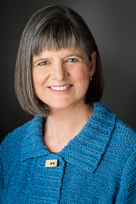 LWVLMR President Henrietta Saunders LWVLMR President Henrietta Saunders We are beaming with pride that LWVLMR President Henrietta Saunders was elected to the national League of Women Voters Board on Sunday, June 19, 2016. She was elected as an officer in the position of Treasurer. Having benefited from her governance ourselves, we are confident that her leadership, fiduciary and pecuniary skills will serve the larger organization well. Congratulations to Hank, and to LWVUS! Members from across the country are arriving in Washington DC for the League of Women Voters Biennial Convention. LWVLMR is proud to cosponsor a caucus on the nexus of water issues and climate change with 2 other InterLeague groups, 1 county League, six state Leagues, and the LWVUS Climate Change Task Force. In preparation for this presentation, we asked Leagues to share their recent activities on these issues.
And we have been impressed and inspired by the response! Clearly, these are important issues in many communities across. Check out the Member Resources page to see the breadth of local projects and programs. 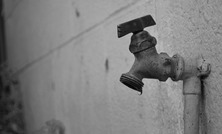 As the terrible news about the Flint, Michigan water crisis flooded the media, the well-being of our colleagues in the League of Women Voters of Flint was among our concerns. Now the LWV of Flint, a member of LWVLMR, has released, The Flint Water Crisis: A Summary Report. The report concisely explains how elevated lead levels in the public water supply became a public health crisis for the residents of Flint. The Flint League notes for the record that LWV of Michigan opposed Michigan's Emergency Management law, which enabled the cascade of fateful decisions that led to the emergency. Sadly, they report that some residents are still not educated about the dangers of lead or about the measures individuals can take to help protect themselves and their children from those dangers. LWV Flint is doing its part to aid the community by sharing information and by registering residents to vote. We highly recommend reading the report in full. Thanks to all who joined us for our sold out Sustainable and Invasive Fish Dinner 2016. Funds were raised to support our work and we learned a little about the fish in our Great Lake. It was a good time to connect with others concerned about Lake Michigan and we shut the place down!
Thanks also to Dirk and Terry Fucik, who graciously hosted us for the third fundraiser at Dirk's Fishmarket in Chicago, for the delicious food and sharing the recipes! Congratulations to the Healing Our Waters Coalition for organizing a terrific Great Lakes Days event in Washington DC. Leaguers played an important part of this group of over 100 Lake lovers who convened in February to get updates on the successes of the Great Lakes Restoration Initiative, hear speakers, and participate in in-person meetings with elected representatives and staff on Capitol Hill. One of our most effective handouts for making our case is a description of restoration successes from around the Great Lakes region, which can be accessed here .
The Great Lakes Restoration Initiative (GLRI) is an inter-agency program designed to address the most significant problems in the Great Lakes and works to protect, restore and maintain the Great Lakes Ecosystem. It has traditionally enjoyed bi-partisan support. At our Congressional breakfast both Republicans and Democrats from both Houses addressed the group in support of our work. Unfortunately, President Obama’s current budget requests only $250 million for FY 2017. We were lobbying to have that amount restored to $300 million to maintain the current level of funding because, although GLRI is showing real and measurable results, there is still plenty of work to be done. LWVLMR supports authorization and multi-year funding of $300 million per year for the GLRI and encourages you to contact your federal legislators in support of this position. The visit was timely as there is heightened concern about drinking water across the states, due to the crisis in Flint, MI. So in addition to the request for GLRI support, we were also asking for a boost to the Clean Water and Drinking Water State Revolving Fund programs that help local communities upgrade aging water infrastructure to protect drinking water, reduce sewer overflows, and prevent beach contamination. Additionally, protection against Asian carp and other invasive species coming through the Chicago Area Waterways was sought, with emphasis on speeding up the Brandon Road Feasibility study by the Army Corps of Engineers. Brandon Road is the site of a Lock and Dam on the Illinois River and was identified as a possible choke point to stop the fish in a previous study which we lobbied for. All of our Great Lakes LWV states except Pennsylvania are members of the Healing Our Waters Coalition. Their annual conference will be September 20-22, 2016 in Sandusky, OH this year and we encourage League members to attend. "If Waukesha's application were approved in its present state, it would set a terrible precedent for the entire Great Lakes region and weaken the Compact!" 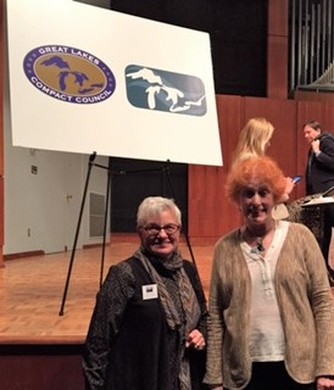 Marjorie Palleon and Claire Vanderslice at the Hearing. Marjorie Palleon and Claire Vanderslice at the Hearing. On Thursday, February 18, 2016, the Carroll University Shattuck Music Center, Room 122, was filled with hundreds of people interested and concerned about the first Great Lakes water diversion application. Busloads of people arrived from all over Wisconsin, Illinois, Michigan, Indiana, and even New York. Most were eager to state why they did not want this diversion to happen. We arrived early to sign up to speak and observe the area. The stage was filled with 12 chairs for the Governors and Premiers or their representatives. A microphone stood ready in the center floor walkway for public hearing presenters. At 2 pm, officials from DNR and Waukesha were on stage with slide presentations. They also answered questions from the audience regarding the diversion, radium pollution and removal, wetlands, sewers, wells, conservation, alternate water sources, and more. Promptly at 3 pm, the chairperson of the Great Lakes and St. Lawrence Governors and Premiers explained the public hearing rules to the audience. No one could speak unless they had signed in, and then been called by the chairperson. The organizers decided the order. First, all 20-30 officials from mayor, alderman, city planners, water and sewer planners and individuals of Waukesha appeared, the mayors of surrounding communities, and finally well know individuals from environmental organizations such as Elizabeth Wheeler, Todd Ambs, George Meyer of WI Wildlife Federation, Karen Hobbs of NRDC, ACLU and many more. It was then 6 pm and supper break was announced. There were 75 presenters left and the Governors and Premiers stated they would stay "until they were done." Many individuals left as the buses were leaving. We also left. Our statement had been received prior to the meeting by email, and we did not know if and when we would be called. Interesting information from the presentations:
Reported by Marjorie Palleon, LWV of Ozaukee Area and LWVLMR Delegate The 2008 Great Lakes Compact protects the water resources of the Great Lakes Basin from diversions and excessive withdrawals. Diversions away from the Great Lakes may be considered under the Compact, but only under strict conditions.
Waukesha, WI, is the first community to apply for a diversion. Some of its water comes from groundwater contaminated by radium and, in 2012, Waukesha began the process of requesting permission to remove water from Lake Michigan and send it to residents and businesses located out of the watershed. A revised diversion application has been approved by the Wisconsin Department of Natural Resources and now goes to the Regional Body and the Governor's Compact Council for review. Interested individuals and organizations may submit comments through March 14, 2016. A public hearing will be held on February 18, 2016, at Carroll University in Waukesha. To read the application and learn about the review process, visit the Wisconsin DNR Waukesha Diversion webpage. NATIVE PLANTS HELP CLEAN WATER, NATURALLY!
We are thrilled to have learned that we will be able to continue spreading that message with the aid of an Illinois Department of Natural Resources Coastal Management Mini-Grant! The grant will fund the development and production of outreach materials and one or more mobile workshops in summer of 2016. We are extremely grateful for this opportunity! Materials will be available for no cost to the local Leagues in the Illinois Coastal Zone, and to other LWVLMR member Leagues at cost. We look forward to working again with local Leagues on this project. More information about this project will be available early in 2016. The LWVIL Education Fund will administer the grant. This is the second coastal management grant LWVILEF and LWVLMR have received; the first funded the first phase of the Stormwater Education project through 2014. |
Archives
December 2017
Categories
All
|

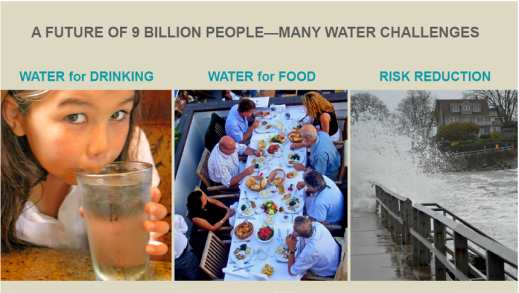
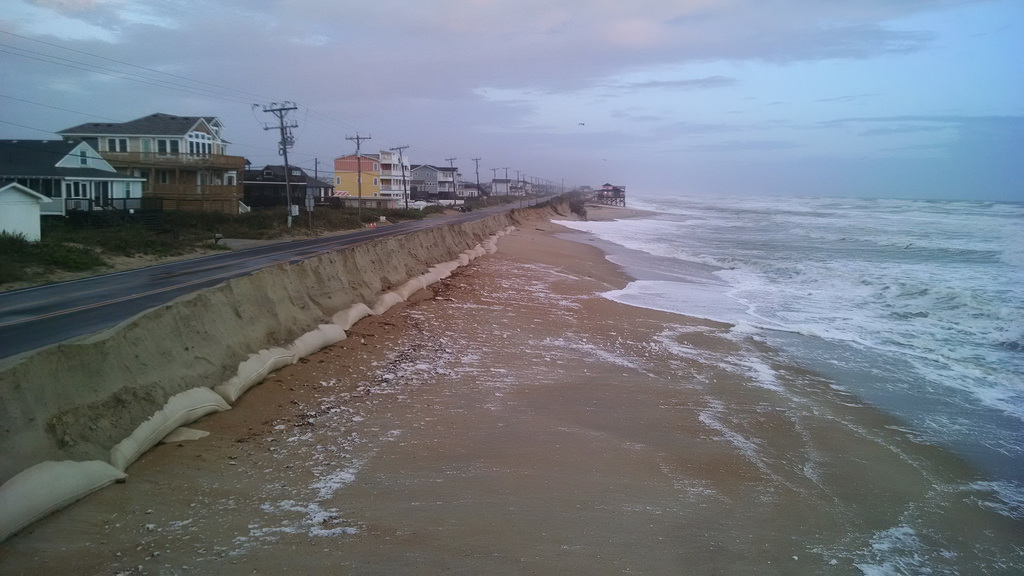
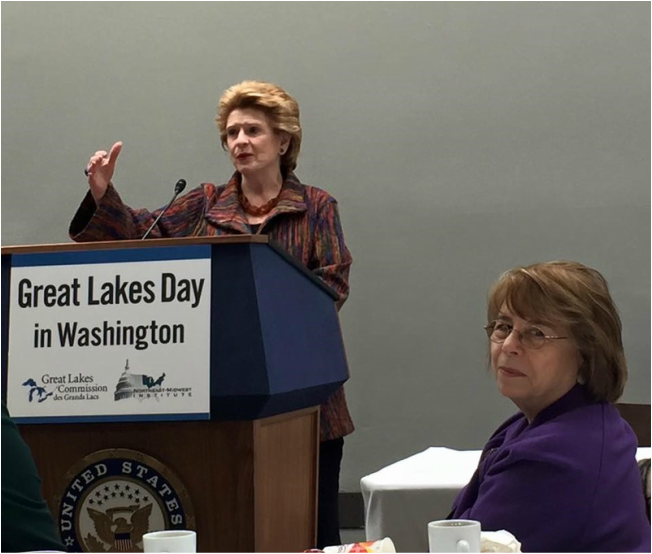
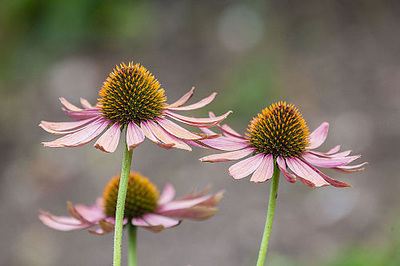
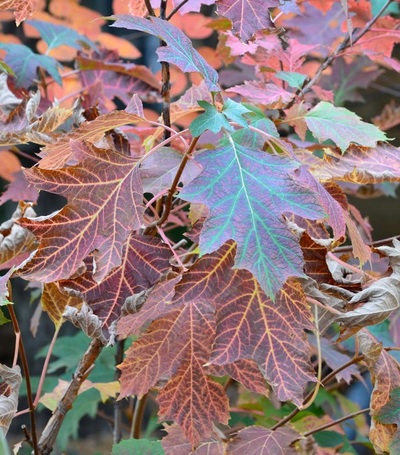
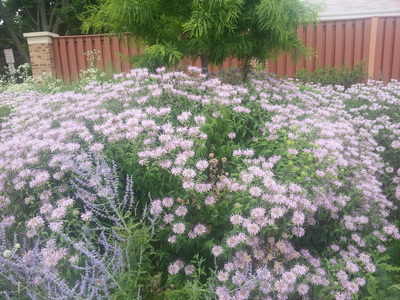
 RSS Feed
RSS Feed